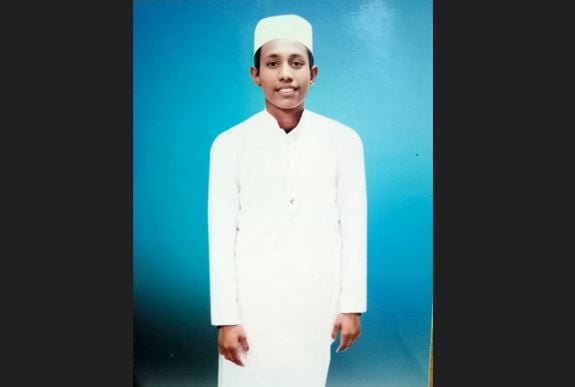News Flash
News Flash

By Syed Altefat Hossain
DHAKA, Jan 4, 2025 (BSS) - Md Jihad Hossain, an 18-year-old Qawmi Madrasah student, left his home on August 5 to join the historic “March to Dhaka Programme”, a monumental part of the Anti-Discrimination Student Movement that ultimately ended 16-year-long fascist regime.
But as the protesters were very close to achieving victory in the movement, Jihad became a martyr sacrificing his life for ousting autocratic ruler Sheikh Hasina.
His 65-year-old father, Md Mosharraf Hossain, who runs a small restaurant at Bibirbagicha area of Jatrabari in the city, recently recounted the tragic day to BSS during an interview.
The pain of losing his son etched deep in his voice. “Jihad left home at 12 noon, promising his mother, Perveen Akter (47), he would return for lunch after the movement,” Mosharraf shared.
With the fall of the autocratic regime, Sheikh Hasina was forced to flee the country along with her sister, which led to celebrations across the country including the capital. Thousands of people flooded the streets in the Jatrabari area in jubilation. But their cheers soon turned into screams when police from Jatrabari Police Station began firing indiscriminately at the crowds. Jihad was among the countless lives lost on that day.
A viral video of that day, showed police emerging in troops from the police station, mercilessly shooting protesters while bodies lay scattered across Jatrabari street, a grim testament to the brutality unleashed.
“I also joined the victory procession on August 5. I was on the west side of the police station when I myself sent five bodies to hospital by a rickshaw-van,” he said.
“While I was busy in transporting bodies to hospitals, around 5pm, I received a shocking call from my sister-in-law,” Mosharraf recalled. The call revealed that Jihad had been shot and taken to a private medical facility in Shanir Akhra.
Eyewitnesses confirmed that Jihad was “shot dead by police” on the east side of Jatrabari Police Station around 4pm. A bullet pierced through the left side of his chest and exited through his back.
“When my son fell on the ground, some students took him to the medical where the duty doctor declared him dead. Then the students took Jihad’s body to our Bibirbagicha residence here,” Mosharraf said in a voice heavy with grief.
Later, they took Jihad’s body to their ancestral home in Muladi Upazila of Barisal and laid him to eternal rest at their family graveyard on August 6.
Jihad was the third among his four siblings. His elder brother, Md Riad Hossain, helps their father run the restaurant. His sister Sabikunnahar is married, and his youngest sister, Samiya, is a ninth-grader.
Recounting his memory throughout the movement, Mosharraf said they regularly joined the movement when it turned into a student-people uprising from July 17.
“On July 19, some terrorists of Awami League beat my sons and vandalized my restaurant. At that time, I immediately ordered my sons to take to the streets until the fascist government collapses”.
“Jihad was more than a son to us. He was a dedicated and caring boy who balanced his studies while helping me run the restaurant business,” Mosharraf shared, saying, “A father carrying his son's body on his shoulders is the heaviest burden in life. I don’t know how we will live our life.”
Numb with grief, Mosharraf said, “I always dreamed of making my son a good Islamic scholar. But a bullet ruined all my dreams.”
He demanded justice for Jihad and other martyrs as many people were killed during the student-led mass upsurge.
He holds former Prime Minister Sheikh Hasina, ex-ministers Obaidul Quader and Asaduzzaman Khan Kamal accountable for the bloodshed.
“Police shot dead my son at the directive of Sheikh Hasina. I want the government to bring the perpetrators to book. I wish to see capital punishment of killers in my lifetime,” Mosharraf said.
His words echo the anguish of countless families whose loved ones were killed during the uprising.